#Bernard Gorcey
Text
Bela Lugosi
Black Dragons 1942.
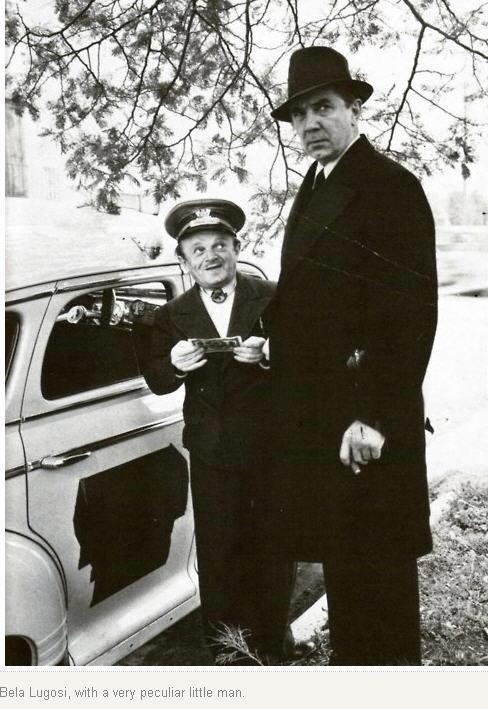
Black Dragons was rushed into production following the attack on Pearl Harbor. It was to begin filming on 17 January 1942, but this was pushed back until 21 January.
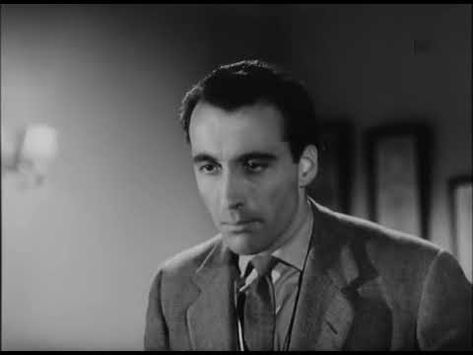


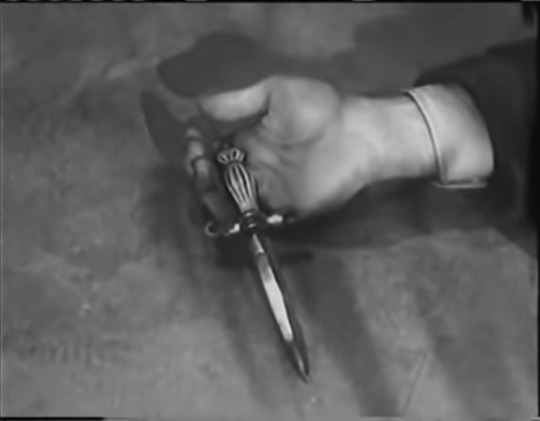
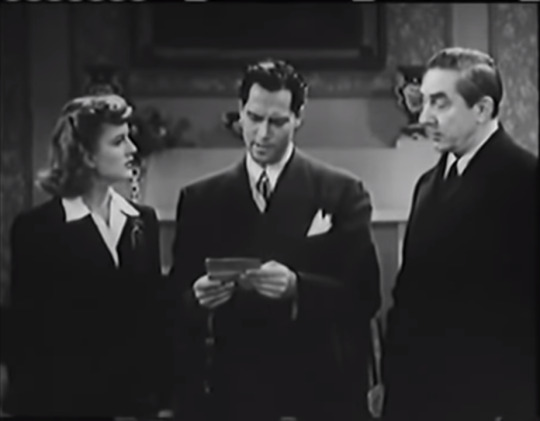

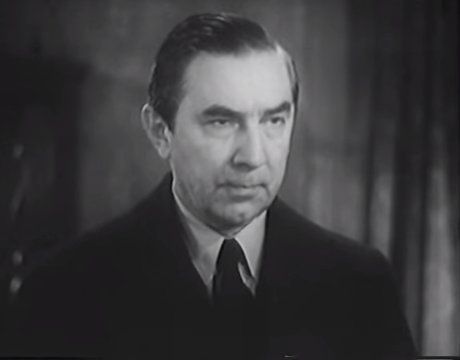
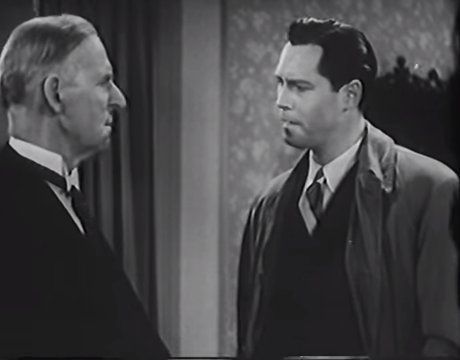

#Clayton Moore#Joan Barclay#Joseph Eggenton#George Pembroke#Robert Frazer#Bernard Gorcey#Bela Lugosi
28 notes
·
View notes
Photo

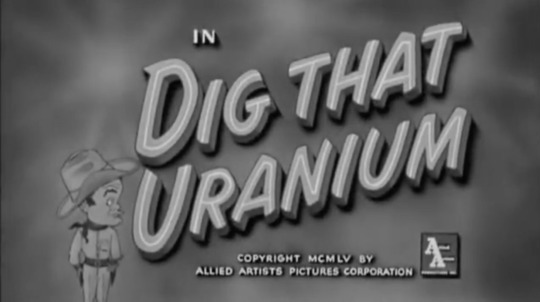
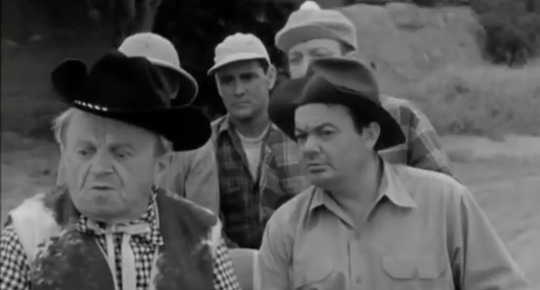




Leo Gorcey: Drunk
14 notes
·
View notes
Text
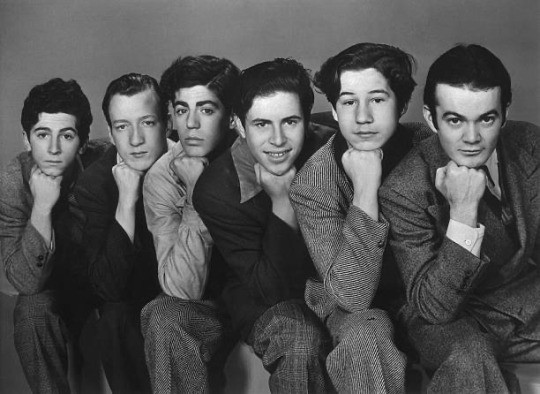
The Dead End Kids aka The Bowery Boys in 1937. L-R: Gabriel Dell, Huntz Hall, Billy Halop, Bernard Punsly, Bobby Jordan, and Leo Gorcey.
30 notes
·
View notes
Text
Out of the Fog
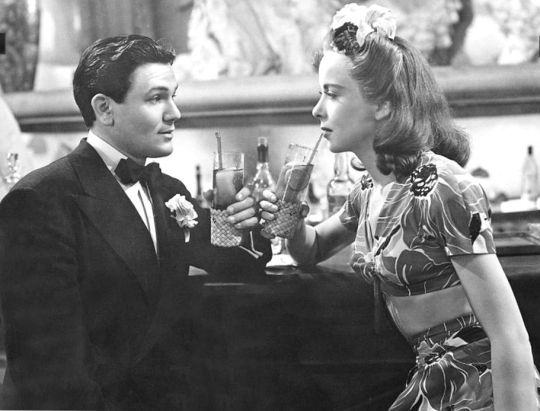
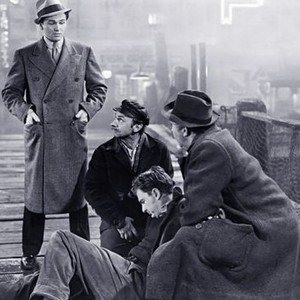
Six months before the U.S. entered World War II, Warner Bros. released an allegory about the need to stand up to fascists. Today it reads like a critique of toxic capitalism (or is that redundant?). Cloaked as a gangster drama, Anatole Litvak’s OUT OF THE FOG (1941) casts John Garfield as a small-time racketeer collecting protection money along the Brooklyn waterfront. Amateur fishermen Thomas Mitchell and John Qualen (both simply wonderful) force themselves to pay up, but when Garfield makes a play for Mitchell’s daughter (Ida Lupino), they start looking for ways to fight back. The film is adapted from Irwin Shaw’s play THE GENTLE PEOPLE, and it still retains a lot of the original’s plummy dialogue, but in the hands of an experienced cast of terrific character actors, it almost sounds like the way people talk, or at least the way they should talk. And Garfield wrestles the dialogue to the ground and comes out a winner. It helps greatly that Litvak fills the screen with clutter to create a lived-in look to the studio sets, and James Wong Howe films some stunning, shadowy images. They create a hermetically sealed world that’s part Warner Bros. gangster-land and part French poetic realism. The opening traveling shot of Garfield walking along a fog-drenched pier is worthy of Marcel Carné. As ever, Lupino is impressively gritty, even if she still maintains remnants of her British accent. Eddie Albert is on hand as the nice normal guy Lupino dumps for Garfield, with Aline MacMahon as her whining hypochondriac mother (there really needs to be more of her), George Tobias as a bankrupt shop-owner, Bernard Gorcey as a two-bit card sharp and, way too briefly, Barbara Pepper as a night-club cigarette girl who might as well be carrying a neon sign reading, “Isn’t she cheap?”
2 notes
·
View notes
Text
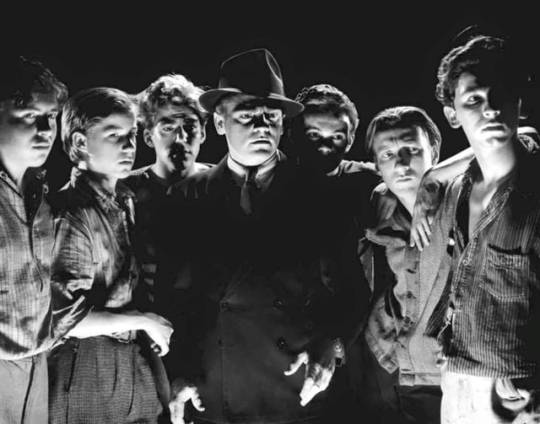
Happy Birthday, Huntz Hall (1920-1999)
Bernard Punsly, Bobby Jordan, Billy Halop, James Cagney, Leo Gorcey, Huntz Hall, and Gabriel Dell, in Michael Curtiz's "Angels With Dirty Faces", 1938
2 notes
·
View notes
Text
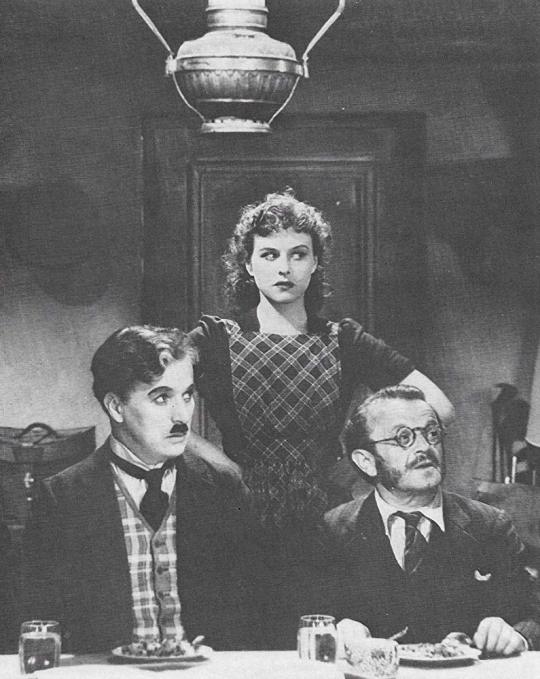
Charlie Chaplin and Paulette Goddard, I believe also with Bernard Gorcey, in The Great Dictator (1940)
#charlie chaplin#charles chaplin#charles spencer chaplin#Paulette Goddard#Bernard Gorcey#the great dictator#1940#Old#black and white#the tramp
54 notes
·
View notes
Photo
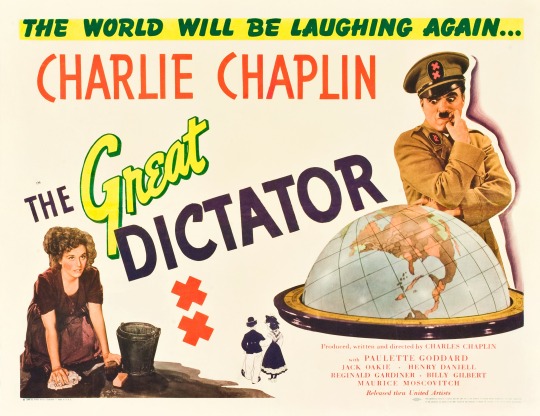
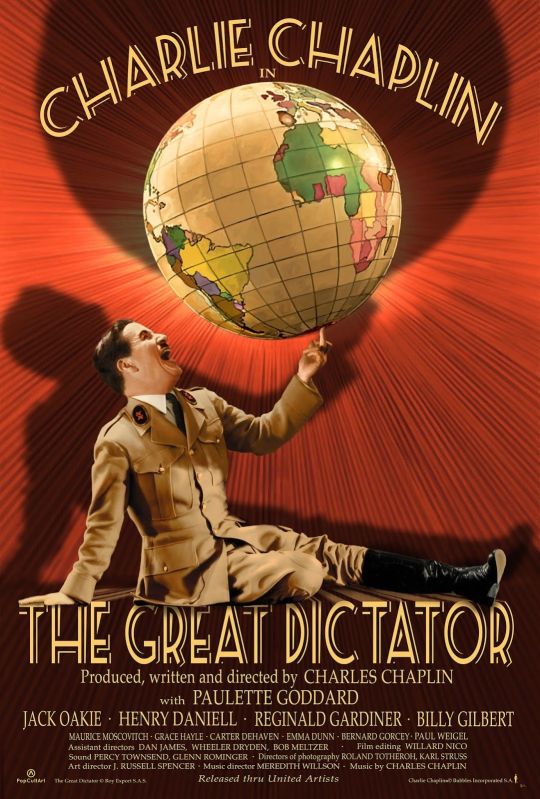
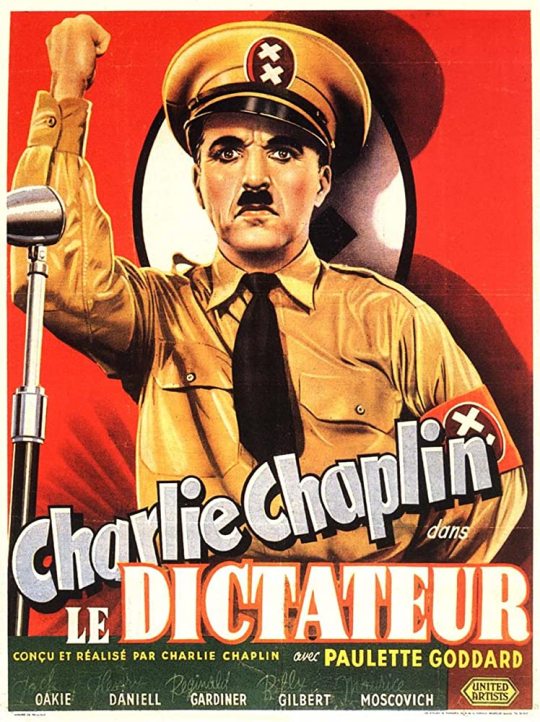
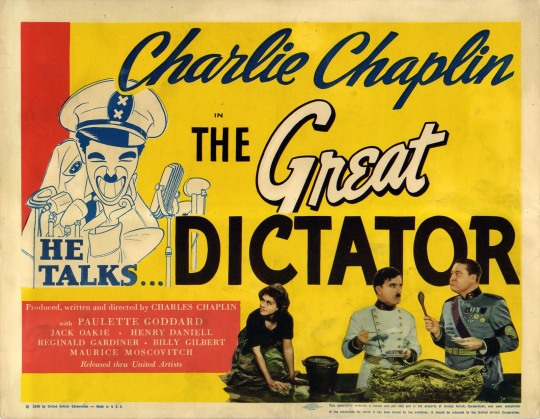
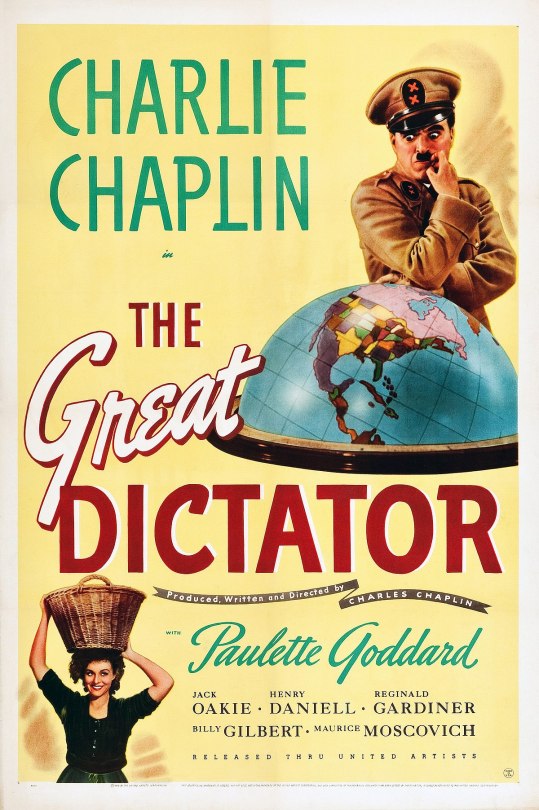
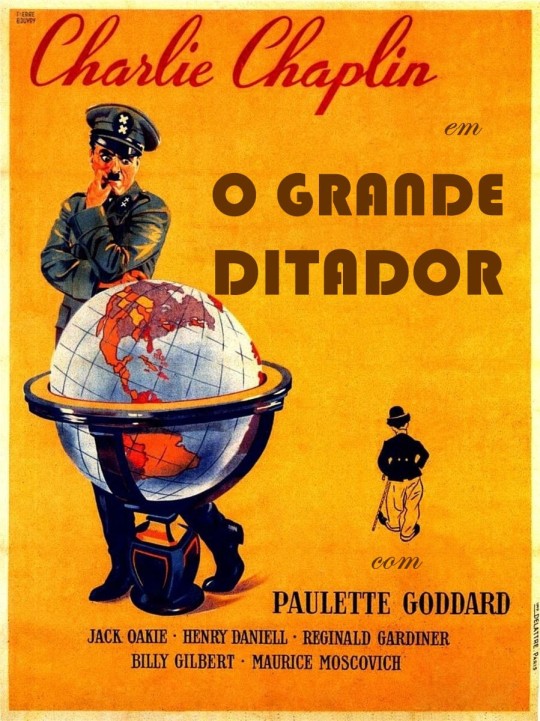
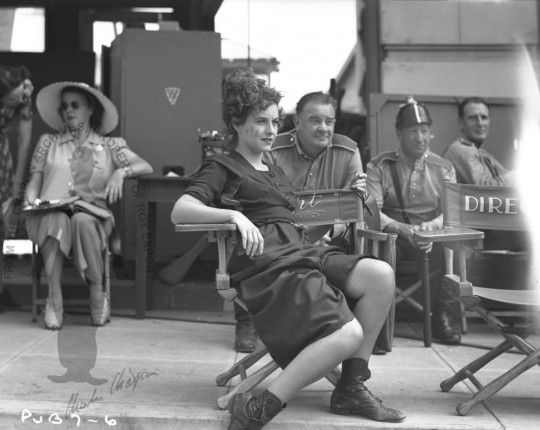
The Great Dictator (1940) Charlie Chaplin
August 2nd 2020
#the great dictator#1940#charlie chaplin#paulette goddard#reginald gardiner#maurice moscovitch#billy gilbert#henry daniell#jack oakie#bernard gorcey#paul weigel#grace hayle#carter dehaven#emma dunn#the dictator
7 notes
·
View notes
Photo
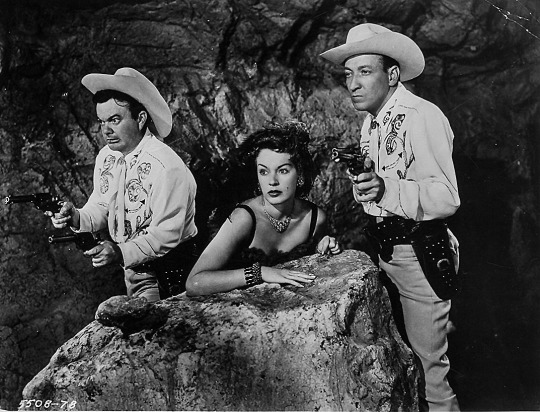
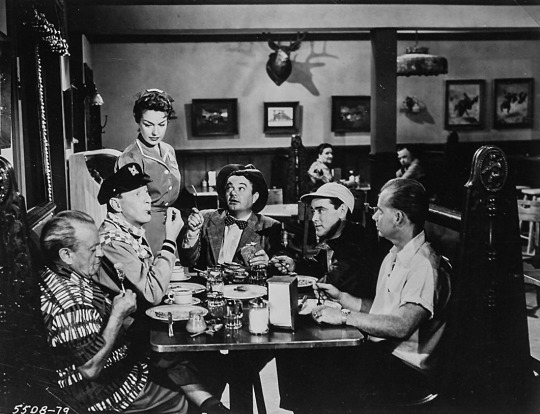
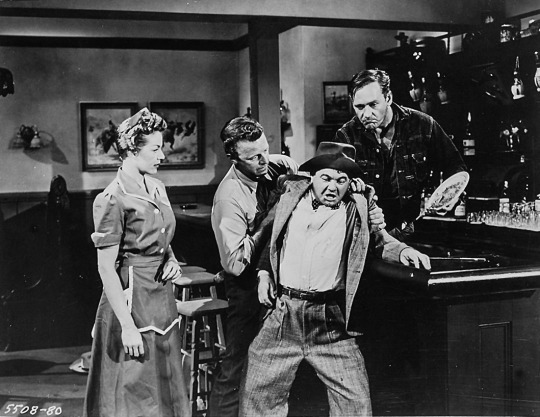
Stills from Dig That Uranium (1956), starring Leo Gorcey, Huntz Hall, Bernard Gorcey, Mary Beth Hughes, and Raymond Hatton.
20 notes
·
View notes
Photo
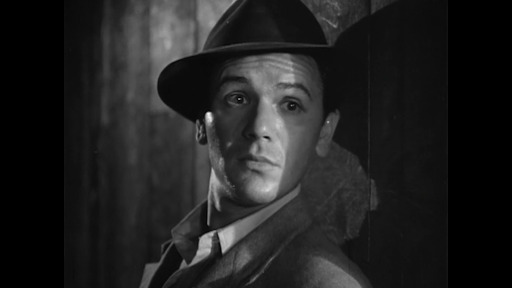
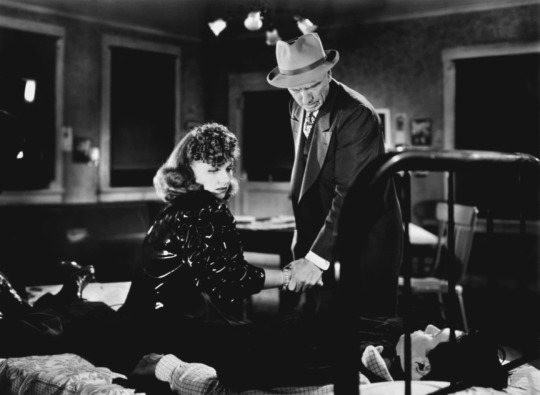
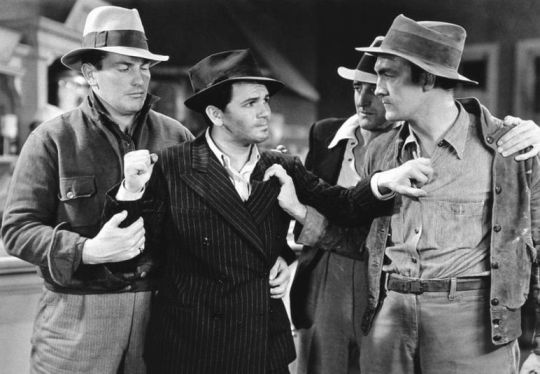
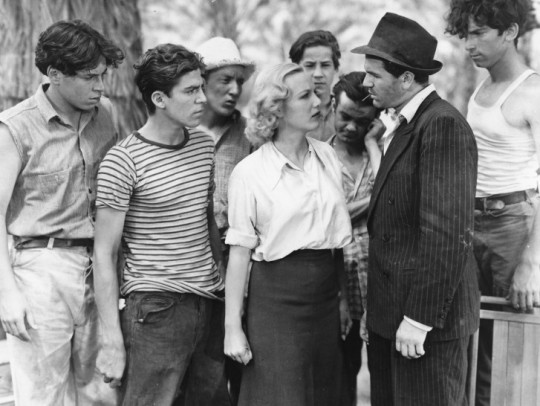
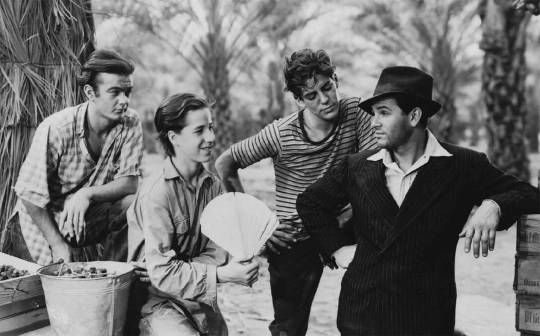
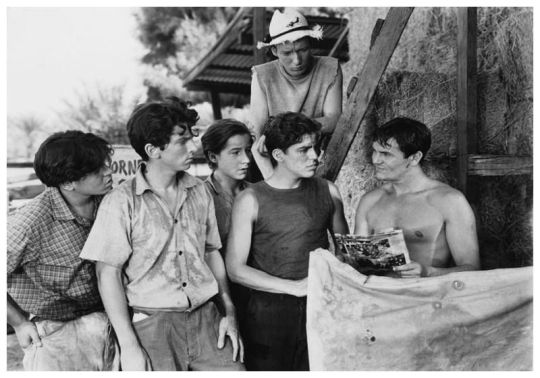
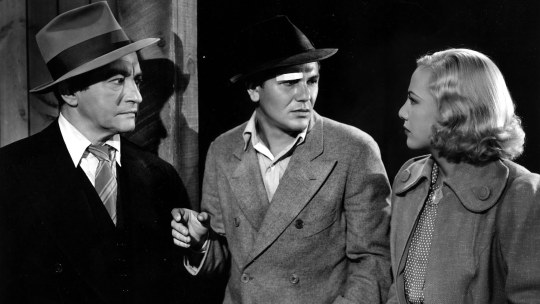
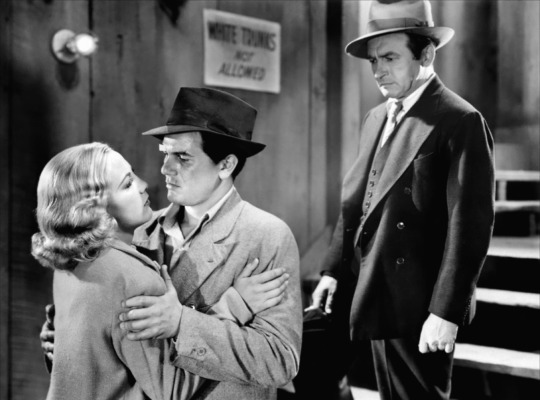
They Made Me a Criminal (Busby Berkeley, 1939)
Cast: John Garfield, Claude Rains, Ann Sheridan, May Robson, Gloria Dickson, Billy Halop, Bobby Jordan, Leo Gorcey, Huntz Hall, Gabriel Dell, Bernard Punsley, Robert Gleckler, John Ridgeley, Barbara Pepper, William B. Davidson, Ward Bond. Screenplay: Sid Herzig, based on a novel and a play by Bertram Millhauser and Beulah Marie Dix. Cinematography: James Wong Howe. Art direction: Anton Grot. Film editing: Jack Killifer. Music: Max Steiner.
They Made Me a Criminal isn't what you'd expect from a film directed by Busby Berkeley: No songs, no dances, and no chorus girls forming kaleidoscopic patterns. Instead, it's a feel-good movie about a boxer (John Garfield) wrongly accused of murder who hides out on a farm in Arizona run by sweet old Grandma Rafferty (May Robson) with the help of the Dead End Kids. But a detective (played by a miscast Claude Rains) is on his trail and threatens to nab him, undoing his good work in helping the Dead End Kids, who are in a sort of reform program, get their lives in order. It's a waste of all the talents concerned, but watchable if you like watching what oddities Hollywood could grind out in the peak years of the studio era.
1 note
·
View note
Photo
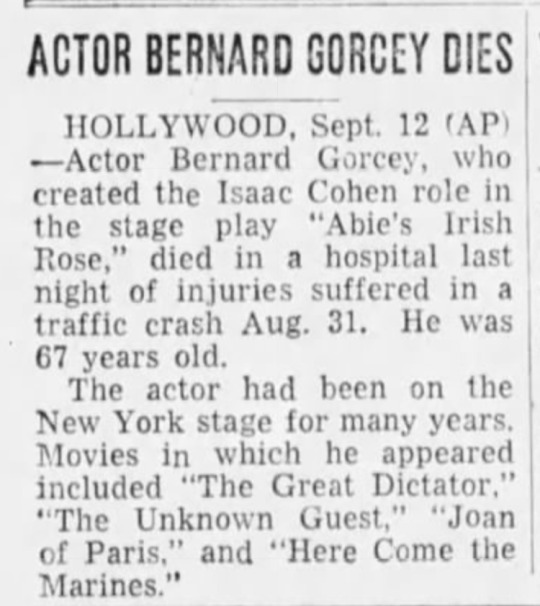
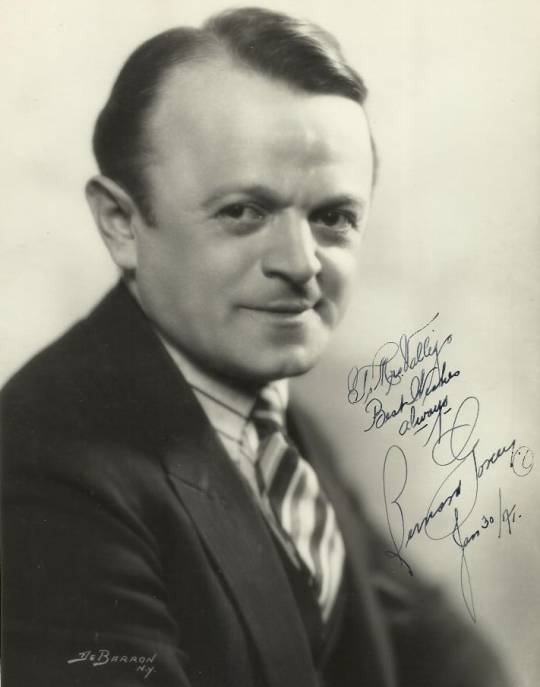
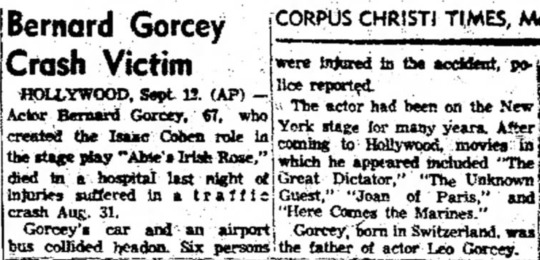
Bernard Gorcey January 9, 1886 - September 11, 1955
2 notes
·
View notes
Text
David Gorcey: Long-Lasting "Kid"
David Gorcey: Long-Lasting “Kid”
A salute today to an important Dead End Kid/ East Side Kid/ Bowery Boy, David Gorcey (1921-1984).
The son of character actor Bernard Gorcey, David started out as a child actor, appearing in vaudeville, and in five Vitaphone shorts in the early ’30s: One Good Deed (1931), Detectuvs (1932), His Honor — Penrod (1932), Hot Dog (1932), and Penrod’s Bull Pen (1932).
In 1935 Gorcey was cast in the…
View On WordPress
2 notes
·
View notes
Photo
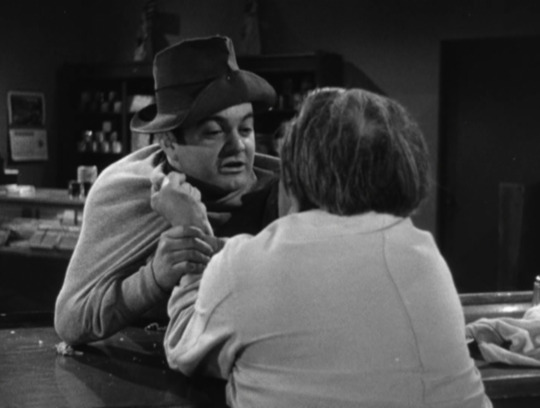
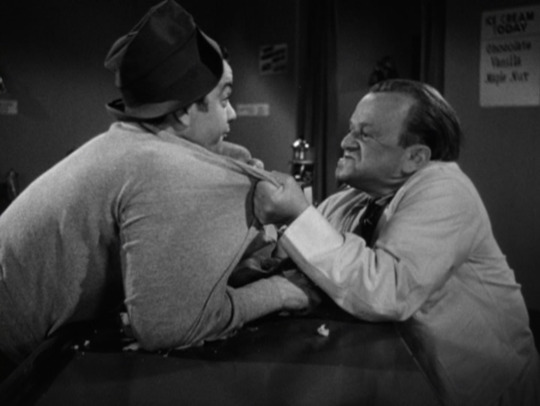
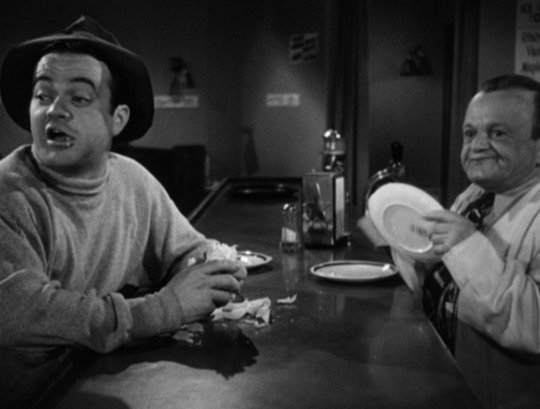
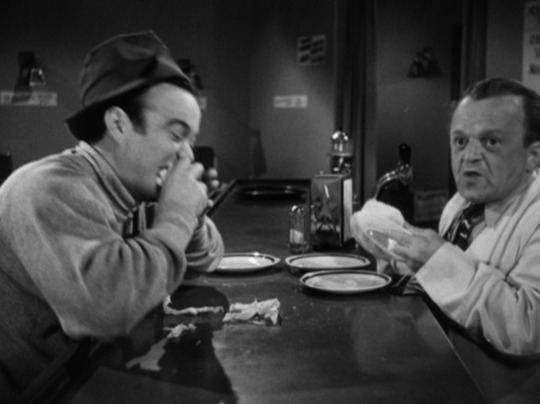
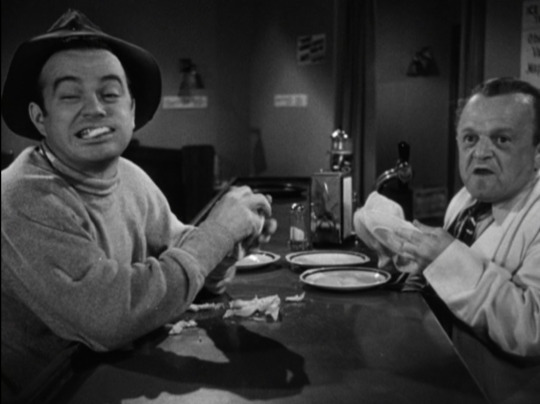
Father and Son - Leo Gorcey and Bernard Gorcey
19 notes
·
View notes
Text
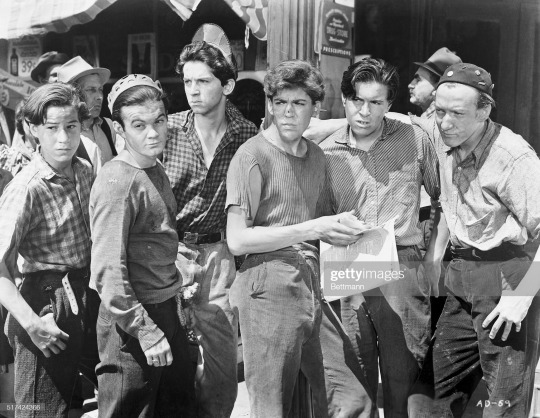
The Dead End Kids (aka The Bowery Boys) at work. Pictured front: Bobby Jordan, Leo Gorcey, Gabriel Dell, Billy Halop, Bernard Punsly, and Huntz Hall.
19 notes
·
View notes
Photo
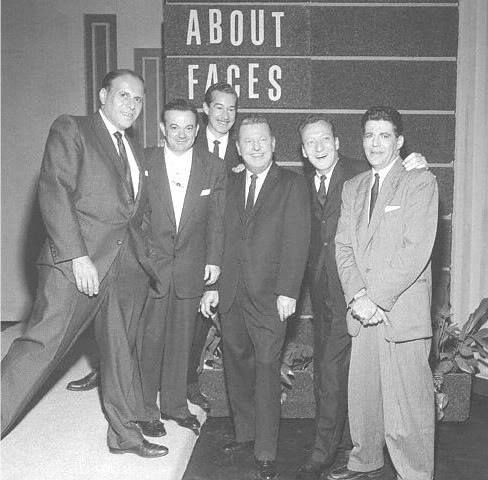
The Dead End Kids in 1960: L-R: Dr. Bernard Punsly, Leo Gorcey, Bobby Jordan, host Ben Alexander, Huntz Hall and Billy Halop on TVs 'About Faces' (missing: Gabe Dell).
0 notes
Text
April 4, 2021: The Great Dictator (1940)(Part Two)
I thought this film was more “Prince and the Pauper”.
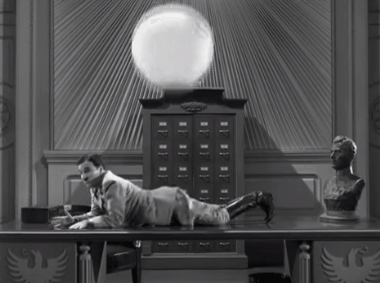
Not that I’m complaining AT ALL, mind you. It’s still a fantastic movie, and I’m having a wonderful time with it. As an early satire, I’m not surprised at how on the nose this is, but I am surprised on how on point it is. Gotta say, it predicted some events of the next 5 years that I don’t think anybody say coming.
I understand why this film is so well-loved, but as for it being a masterpiece...well, I know why that is as well, but that hasn’t happened yet. That’ll be coming at the end of this film, I know that much. So, until then, let’s keep going, full speed ahead! First part’s right here!
Recap (2/2)
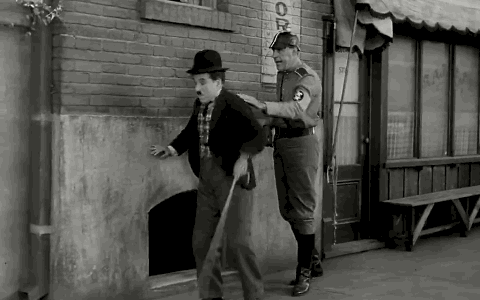
In an eerie forecast of the tragedies to come, the stormtroopers assault the ghetto and its people. However, still believing Schultz’ orders to be in place, they spare the Barber and his section of the ghetto. But the news quickly passes down, and the stormtroopers go for the Barber once and for all, destroying his shop. And as we hear the sound of breaking glass, and see the shop and the ghetto on fire...it’s eerie, is all I’m saying. Haunting.
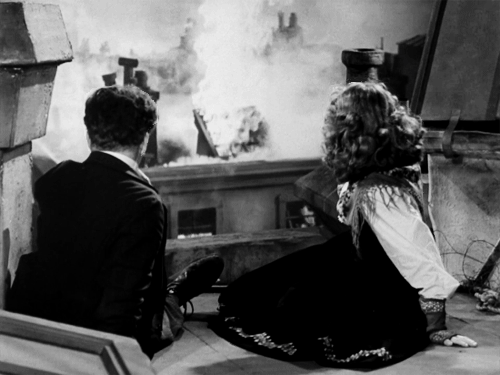
On the roof, Hannah and the Barber watch the shop burn. Hannah tries to convince the Barber to go with her to neighboring Osterlich, a free country where they can settle down and farm. They stay on the roof until nightfall, when they receive news that Schultz has escaped the camp, and his hiding down below. In a meeting with some of the men of the ghetto, the Barber included, he tries to convince the men that they must assassinate Hynkel.
However, one of them must die in the effort. Because he’s too well-known, Schultz can’t do it. Convenient, huh? The men use a complicated cake-based system to choose. There are coins baked in the cakes, and whoever gets the coin is chosen assassin. In the process, the Barber eats three of them. It’s very funny. Turns out EVERYBODY had a coin, which was executed by Hannah to convince the group that this is a terrible idea. They agree, and retire for the evening.
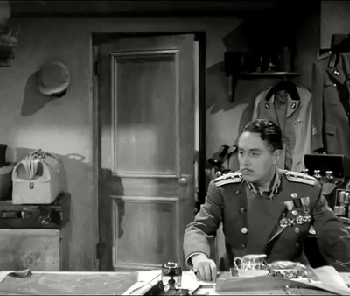
Fellow villager Mr. Mann (Bernard Gorcey), comes to warn them the next morning about the stormtroopers, who suspect that Schultz is there in the ghetto. They go to warn him, and attempt to hide him on the roof. But that quickly fails, and both Schultz and the Barber are arrested and sent to a concentration camp. Meanwhile, Hannah and some of the other residents flee to Osterlitz, where life is far better and quieter.
But not for long, as Hynkel announces to his inner cabinet that they will soon be ready to march on Osterlich, which they’ve been planning for a while. And they aren’t the only ones! Neighboring country Bacteria, led by Benzino Napaloni (Jack Oakie), is also intending to invade Bacteria. In response, Hynkel declares war on Bacteria as well. This is IMMEDIATELY preceding a phone call, during which they invite him to see their military might. War is also undeclared by Hynkel.
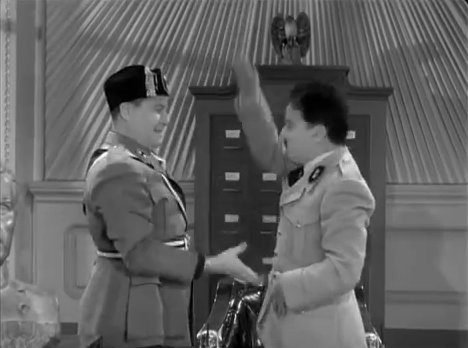
Napaloni, a rotund dictator who comes in on a train and speaks in pseudo-Italian (YUP), arrives there with his wife, Madame Napaloni (Grace Hayle), and Hynkel gives the two a welcome to the country. Also, WOW, didn’t realize that that shitty stereotypical fake Italian accent that people still put on when joking (which is pretty offensive, in and of itself) was THAT OLD. It was in Duck Soup, too!
Anyway, they plan to psychologically manipulate him into doing what they want him to do, which immediately fails. The two decide upon getting a quick cut at the palace’s barber shop, and compete with each other using the chairs there. After this, they witness a show of Tomania’s military might, and it’s all...it’s all very funny, even given the goddamn CONTEXT.
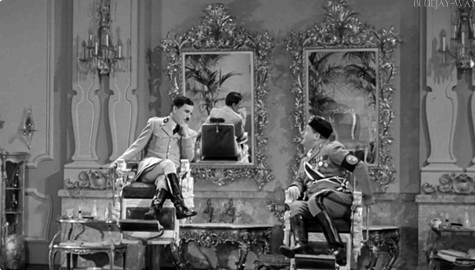
That night, there’s a grand dinner and ball, and the two dictators finally come head-to-head when disputing who will invade Austerlich. This leads to an argument, and that eventually leads to both of them eating too much “English mustard”, which is quite spicy, and then just turns into a straight-up food fight. ut eventually, Hynkel decides to sign a treaty that will cause Napolini to take his troops off the border. This will allow Hynkel to break the conditions of that treaty and invade, without losing a man. The next day, this is exactly what he does, disguising the invasion as armed guards watching him as he goes duck hunting on the border.
At the same time, Schultz and the Barber have escaped, having stolen guard uniforms from the camp. Guards from the camp are looking for them, and find HYNKEL, who’s fallen out of his boat while duck hunting. Mistaking him for the Barber, they knock him out and drag him to the camp! The Barber, meanwhile, is being mistaken for Hynkel, and they meet the troops at the Osterlich border who’ve been waiting for Hynkel to arrive to begin the invasion. Schultz, realizing what’s going on, tells the Barber to go along with the whole thing, and the troops assault the country and its people, including Hannah and Mr. Jaeckel.
Eventually, the Barber winds up on stage, and must speak to the people in a live broadcast, or be caught alongside Schultz. And he does. And...well...it’s the most iconic scene in the film. And arguably, the greatest speech in all of film.
youtube
Chaplin resisted speaking in his films for so long. For SO LONG, he resisted delivering intent through words rather than actions. And so, when he finally does so...he excels. This is an absolutely beautiful speech. It’s painfully relevant, and the best speech I’ve ever seen in a film. And...there’s no need for anything else, really. Hannah hears the speech as well, the last part of which is addressed to her, directing her to look up, into the light of hope. And to her friends and fellow Jews, she simply says...
Listen.
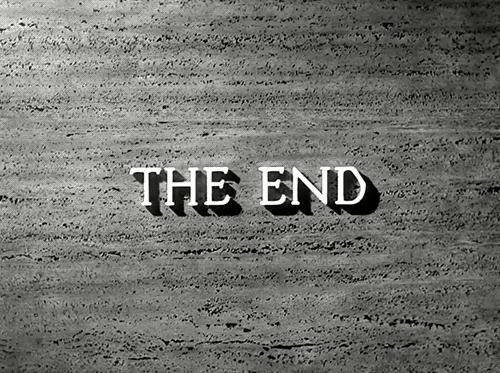
See you in the Review.
#the great dictator#charlie chaplin#paulette goddard#jack oakie#henry daniell#reginald gardiner#billy gilbert#maurice mossovich#comedy april#user365#365days365movies#365 movie challenge#365 movies 365 days#365 Days 365 Movies#365 movies a year
0 notes
Photo
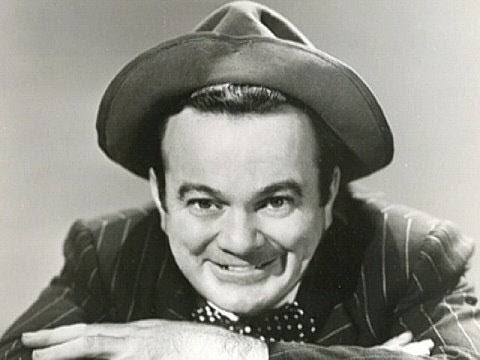
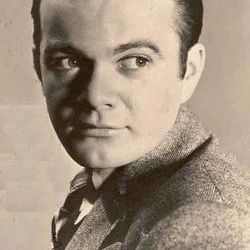
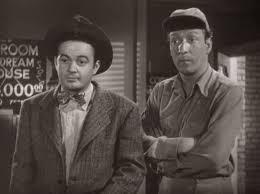
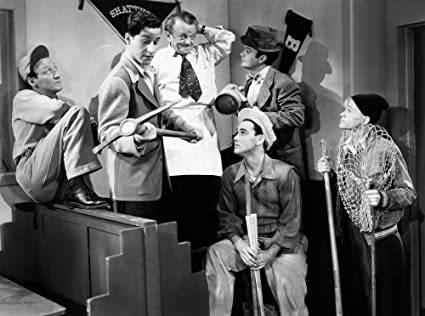
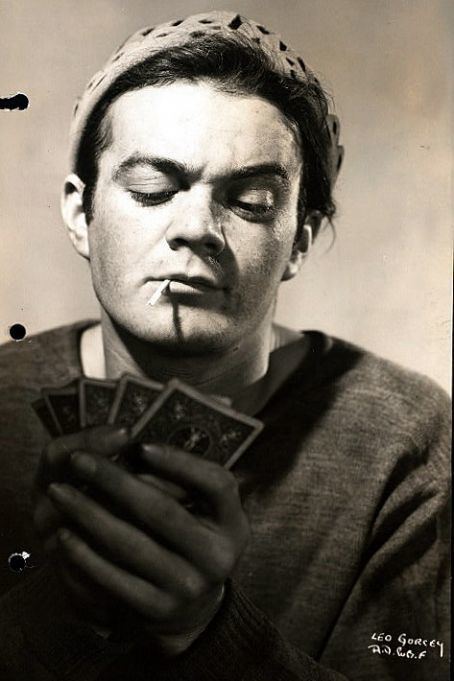
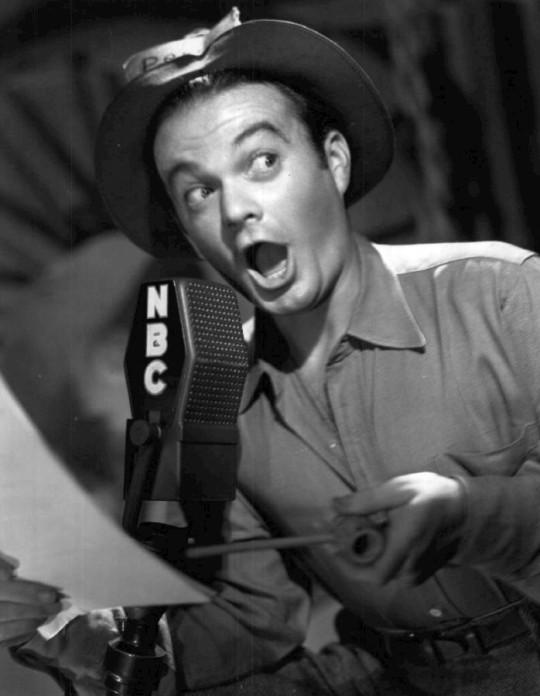
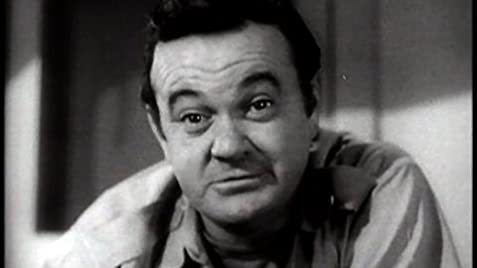
Arrivals & Departures
03 June 1917 – 02 June 1969
Celebrate Leo Bernard Gorcey Day!
Leo Bernard Gorcey (03 June 1917 – 02 June 1969) was an American stage and movie actor who became famous for portraying the leader of a group of young hooligans known variously as the Dead End Kids, The East Side Kids and, as adults, The Bowery Boys. Always the most pugnacious gang member, Leo was a prototype of the young punk. He was also the shortest member of the original gang..
0 notes